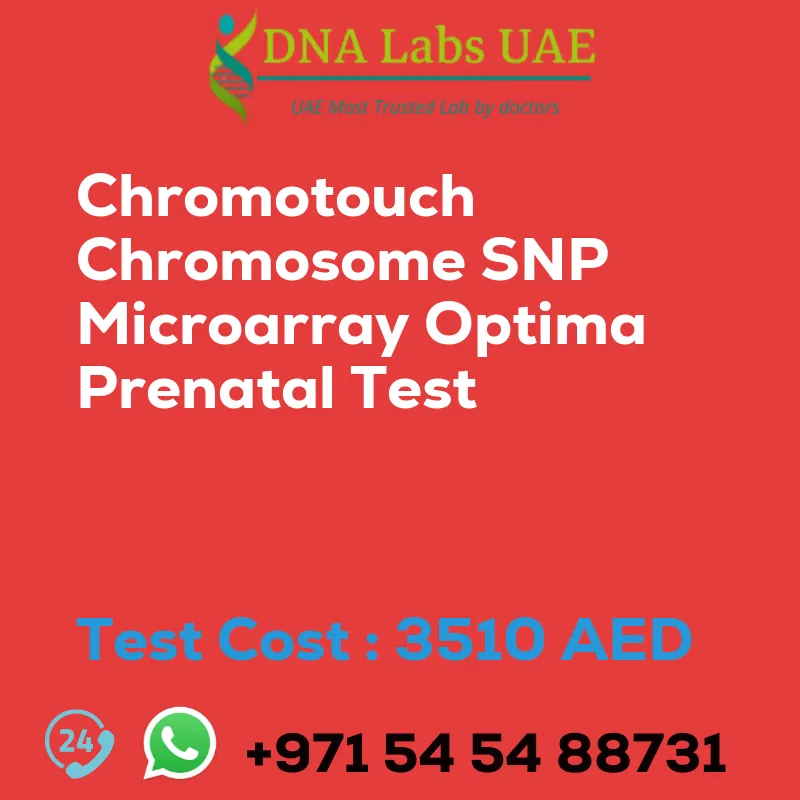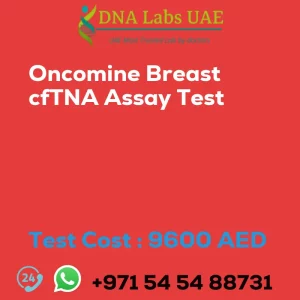CHROMOTOUCH CHROMOSOME SNP MICROARRAY OPTIMA PRENATAL Test
Cost: AED 3510.0
Test Components
- Price: AED 3510.0
- Sample Condition:
- Amniotic fluid: 15 mL (10 mL min.) in a sterile screw capped container.
- Chorionic villus: 30 mg (20 mg min.) biopsy collected aseptically in 10 mL transport medium available from LPL.
- Umbilical Cord blood: 4 mL (2 mL min.) cord blood in 1 Lavender top (EDTA) tube. Avoid clot formation during sampling. Ship refrigerated immediately. DO NOT FREEZE.
- Duly filled Genomic Microarray Requisition Form (Form 19) & Consent form (Form 18) for Prenatal genetic testing is mandatory.
Report Delivery
Sample Daily by 4 pm; Report 10 Working days
Method
Affymetrix Optima Suite Microarray
Test Type
Genetic Disorders
Doctor
Gynecologist
Test Department
CYTOGENETICS
Pre Test Information
Duly filled Genomic Microarray Requisition Form (Form 19) & Consent form (Form 18) for Prenatal genetic testing is mandatory.
Test Details
The CHROMOTOUCH CHROMOSOME SNP MICROARRAY OPTIMA PRENATAL Test is a prenatal genetic test that analyzes the chromosomes of a fetus to detect any abnormalities or genetic disorders. It uses a microarray technology that examines single nucleotide polymorphisms (SNPs) across the genome to identify any variations or deletions in the chromosomes.
This test is performed on a sample of amniotic fluid or chorionic villus sampling (CVS) tissue, which is collected during pregnancy. It can provide information about the baby’s risk for genetic conditions such as Down syndrome, Edwards syndrome, Patau syndrome, and other chromosomal abnormalities.
The CHROMOTOUCH CHROMOSOME SNP MICROARRAY OPTIMA PRENATAL Test offers high accuracy and sensitivity in detecting genetic abnormalities, providing expectant parents with valuable information about their baby’s health and potential medical conditions. This information can help guide decisions about prenatal care and treatment options.
It is important to note that this test is typically recommended for women with a higher risk of having a baby with a chromosomal abnormality, such as advanced maternal age or a family history of genetic disorders. It is always advised to consult with a healthcare professional or genetic counselor to determine if this test is appropriate for an individual’s specific situation.
| Test Name | CHROMOTOUCH CHROMOSOME SNP MICROARRAY OPTIMA PRENATAL Test |
|---|---|
| Components | |
| Price | 3510.0 AED |
| Sample Condition | Amnotic fluid: 15 mL (10 mL min.) in a sterile screw capped container.\n Chorionic villus: 30 mg (20 mg min.) biopsy collected asceptically in 10 mL transport medium available from LPL.Umblical Cord blood: 4 mL (2 mL min.) cord blood in 1 Lavender top (EDTA) tube. Avoid clot formation during sampling. Ship refrigerated immediately.DO NOT FREEZE. Duly filled Genomic Microarray Requisition Form (Form 19) & Consent form (Form 18) for Prenatal genetic testing is mandatory. |
| Report Delivery | Sample Daily by 4 pm; Report 10 Working days |
| Method | Affymetrix Optima Suite? Microarray |
| Test type | Genetic Disorders |
| Doctor | Gynecologist |
| Test Department: | CYTOGENETICS |
| Pre Test Information | Duly filled Genomic Microarray Requisition Form (Form 19) & Consent form (Form 18) for Prenatal genetic testing is mandatory. |
| Test Details |
The CHROMOTOUCH CHROMOSOME SNP MICROARRAY OPTIMA PRENATAL Test is a prenatal genetic test that analyzes the chromosomes of a fetus to detect any abnormalities or genetic disorders. It uses a microarray technology that examines single nucleotide polymorphisms (SNPs) across the genome to identify any variations or deletions in the chromosomes. This test is performed on a sample of amniotic fluid or chorionic villus sampling (CVS) tissue, which is collected during pregnancy. It can provide information about the baby’s risk for genetic conditions such as Down syndrome, Edwards syndrome, Patau syndrome, and other chromosomal abnormalities. The CHROMOTOUCH CHROMOSOME SNP MICROARRAY OPTIMA PRENATAL Test offers high accuracy and sensitivity in detecting genetic abnormalities, providing expectant parents with valuable information about their baby’s health and potential medical conditions. This information can help guide decisions about prenatal care and treatment options. It is important to note that this test is typically recommended for women with a higher risk of having a baby with a chromosomal abnormality, such as advanced maternal age or a family history of genetic disorders. It is always advised to consult with a healthcare professional or genetic counselor to determine if this test is appropriate for an individual’s specific situation. |








